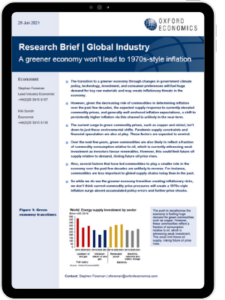A greener economy won’t lead to 1970s-style inflation

The transition to a greener economy through changes in government climate policy, technology, investment, and consumer preferences will fuel huge demand for key raw materials and may create inflationary threats in the economy.
However, given the decreasing role of commodities in determining inflation over the past few decades, the expected supply response to currently elevated commodity prices, and generally well anchored inflation expectations, a shift to persistently higher inflation via this channel is unlikely in the near-term.
What you will learn:
- Pandemic supply constraints and financial speculation are also at play
- Over the next few years, green commodities are also likely to reflect a fraction of commodity consumption
- Also, several factors that have led commodities to play a smaller role in the economy
Tags:
Related Services

Post
Eurozone: Little sign of harm from the Red Sea disruptions
The impact of Red Sea shipping disruption on the eurozone economy continues to be limited, in line with our baseline view. Our new Eurozone Supply Stress Indicator suggests that supply pressures have returned to normal following a period of easing in 2023.
Find Out More
Post
GCC: Key themes shaping city economies in the near term
For Gulf cities, the near-term outlook will be tied not only to the global macroeconomic backdrop, but also the progress of the diverse visions and strategies in the region. With the aim to diversify their economies and reduce the dependence on oil, Gulf states continue to invest in the non-oil economy and implement various reforms. That said, oil revenues remain key to funding diversification efforts.
Find Out More